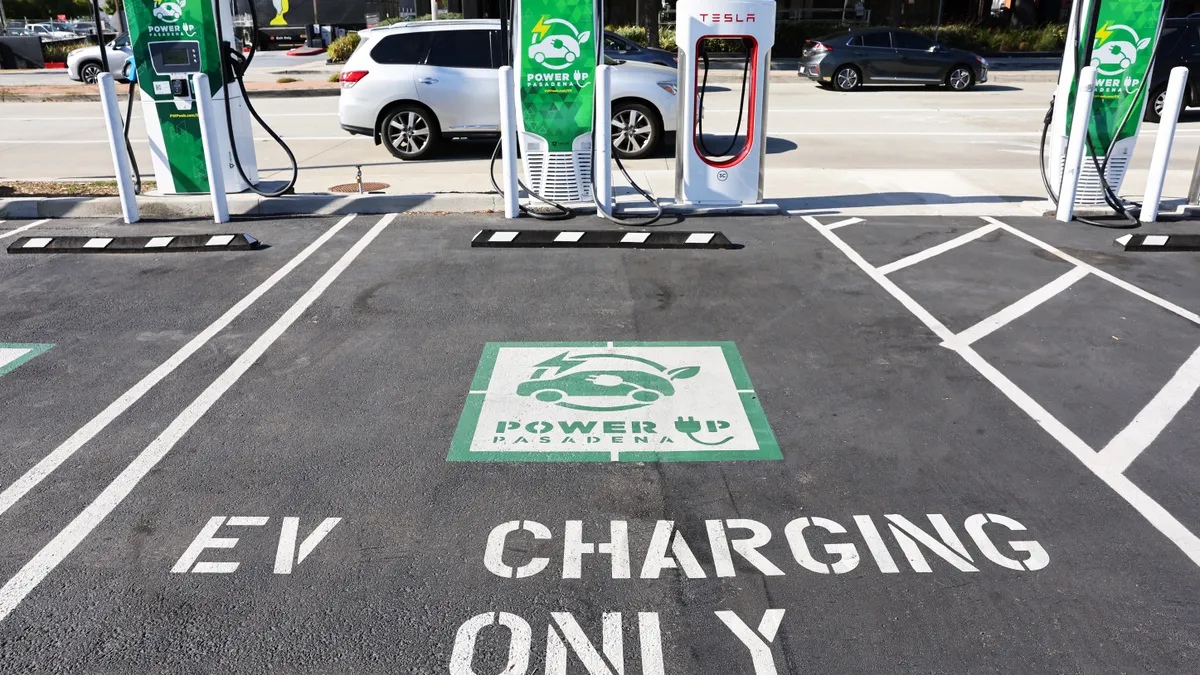Dive Brief:
- Minnesota lawmakers are considering legislation to establish a $2,500 rebate for electric vehicle purchases, require utilities to file transportation electrification plans every three years beginning in 2024 and authorize utilities to own and operate public charging stations.
- Retailers and other businesses represented by the Charge Ahead Partnership say allowing ratepayer-supported utilities such as Xcel Energy to own EV charging infrastructure will stifle the private market and raise customer power bills.
- Similar legislation was enacted in New Mexico and Colorado, where Xcel also operates, the utility said. The Minnesota measure would “provide a more robust framework for utility transportation electrification plans, with greater clarity and direction on the types of things that utilities would be expected to address,” the company said in a statement.
Dive Insight:
Utility ownership of charging infrastructure can help deploy stations in nascent markets and hard to serve areas, advocates of the policy say. Critics say the approach would give the power company competitive advantages that dissuade others from entering the market.
“We believe this legislation will establish a strong foundation for utility support for transportation electrification that will serve Minnesota well, and we look forward to working with legislators to support it this session,” Xcel spokesperson Lacey Nygard said in an email.
But utility ownership of EV chargers has a “chilling effect on anyone even pondering making private investment,” Ryan McKinnon, spokesperson for the Charge Ahead Partnership, said. The group’s members include the National Grocers Association, National Retail Federation, energy marketers, truck stops and convenience stores.
Utilities have too many advantages, McKinnon said, including benefiting from subsidized capital costs of their chargers by ratepayers.
“But then, because they're the ones generating and distributing and selling the electricity, they don't apply demand charges to their own stations,” McKinnon said. “And as a result, they're able to sell EV charging at a rate that no private entity would be able to compete with, because it's being completely subsidized by all the ratepayers.”
The legislation, HF 413, was introduced by Rep. Zack Stephenson, a member of the Minnesota Democratic–Farmer–Labor Party. The Minnesota House Sustainable Infrastructure Policy committee has scheduled a hearing on the bill Wednesday.
Stephenson did not immediately respond to questions about the bill.
The proposal specifies that utility transportation electrification plans may include “utility investments and incentives to facilitate the deployment of electric vehicles, customer- or utility-owned electric vehicle charging stations, electric vehicle infrastructure and other electric utility infrastructure.”
Xcel has already submitted a plan to the Minnesota Public Utilities Commission to add about 730 high-speed charging stations across Minnesota, including up to about 1,470 charging ports in total between 2024 and 2026.
“Our proposal will create a foundational public charging network to help fill only part of this massive gap and help the state of Minnesota reach its goal of having 20% of light duty vehicles be electric by 2030,” Nygard said.
Because EV policies are still relatively new, for now the issue of utility ownership is not specifically addressed in most jurisdictions, said McKinnon. “Most states I would predict in the next several years will eventually adopt laws addressing this, but at this point, it's something that most are quiet on,” he said.
The California Public Utilities Commission approved a new state rebate program for EV charging investments in November, but regulators made clear the rebates could not be used by utilities.
“Utilities will not be permitted to own any of this infrastructure,” former CPUC Commissioner Clifford Rechtschaffen said in November deliberations. “That will mean lower costs for ratepayers.” Rechtschaffen left the PUC at the beginning of this year.
“While there has been an argument fo utility ownership in a nascent market ... by mid-decade, utility ownership should not be necessary,” Rechtschaffen said.















